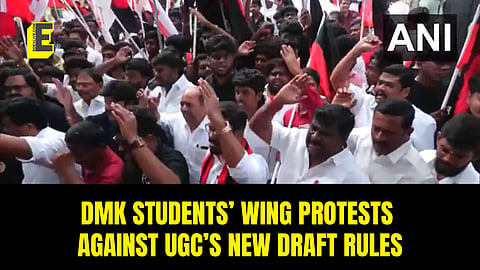

Today, Friday, January 10, members of the Dravida Munnetra Kazhagam (DMK) students' wing organised a protest at Valluvar Kottam in Chennai, opposing the University Grants Commission’s (UGC) new draft guidelines for the appointment of vice-chancellors (VCs).
Earlier in the week, Tamil Nadu Chief Minister MK Stalin strongly criticised the draft rules in the State Assembly, moving a resolution to demand their withdrawal, ANI reported.
In his address, Stalin denounced the guidelines as an infringement on federalism and a threat to Tamil Nadu's higher education system. He also criticised the imposition of the New Education Policy (NEP), claiming it was designed to degrade the education system.
Referencing the tragic case of student Anitha, who died due to the pressures of the National Eligibility-cum-Entrance Test (NEET) exam, Stalin condemned NEET for its alleged malpractice.
UGC draft rules 2025
The UGC's new draft rules propose significant changes to the process of appointing faculty members and vice-chancellors.
The guidelines, announced by Education Minister Dharmendra Pradhan on Monday, January 6, would allow candidates to qualify for faculty positions based on their UGC-NET scores in a subject of their choice, regardless of whether their undergraduate and postgraduate degrees align with that subject.
Additionally, the draft rules widen the pool of eligible candidates for vice-chancellor positions, opening it up to professionals from diverse fields such as academia, research institutions, public policy, administration, and even industry.
One of the key changes in the new guidelines is that the subject of a candidate's PhD degree would now take precedence over their undergraduate and postgraduate disciplines when it comes to faculty selection.
This move has sparked criticism from various political leaders, ANI added.
Kerala's Higher Education Minister R Bindu joined the chorus of opposition, calling the guidelines a violation of India's federal principles. She accused the central government of pushing a strategy of "saffronisation, over-centralisation, and communalisation" within the education sector. Bindu further criticized the potential for industrialists to be appointed as vice-chancellors, warning that such appointments could diminish academic standards.
